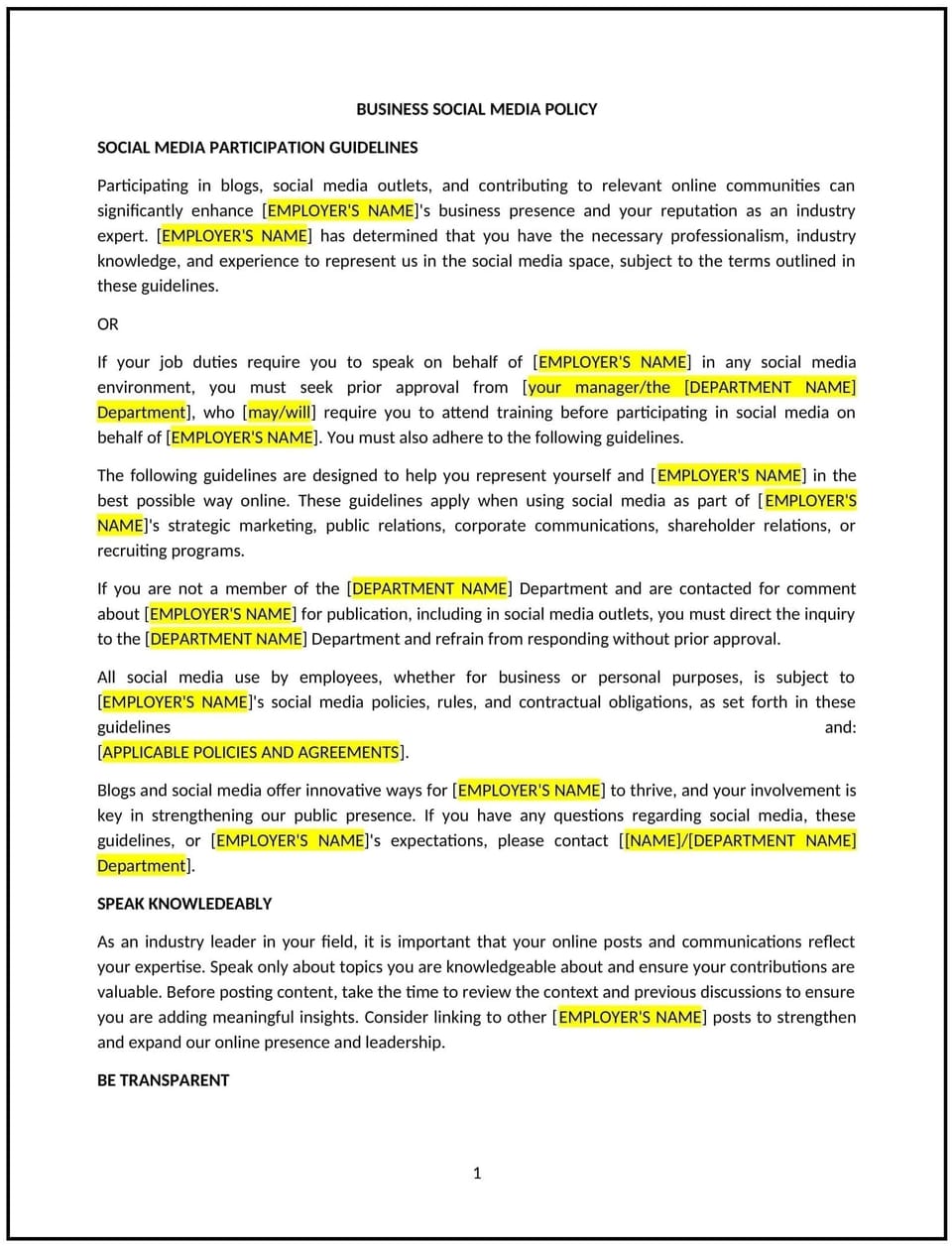Business social media policy (Kansas): Free template

Business social media policy (Kansas)
A business social media policy helps Kansas businesses establish clear guidelines for employees using social media for work-related purposes. This policy defines appropriate use, protects company reputation, and outlines expectations for professional conduct on public platforms.
By implementing this policy, businesses can promote responsible social media use, safeguard brand identity, and mitigate potential risks associated with online communication.
How to use this business social media policy (Kansas)
- Define acceptable use: Businesses should clarify when and how employees may use social media for work-related activities, including posting on official accounts or discussing company matters.
- Establish professional conduct guidelines: Employees should be expected to maintain respectful and appropriate communication when representing the business online.
- Outline confidentiality protections: Businesses should prohibit the sharing of confidential, proprietary, or sensitive company information on social media.
- Address personal social media use: Businesses should guide employees on distinguishing personal opinions from official company statements and include disclaimers when necessary.
- Set content approval procedures: Businesses should establish who is authorized to post on company accounts and whether approval is needed before publishing content.
- Provide crisis response protocols: Businesses should define procedures for handling social media crises, such as negative press, customer complaints, or security breaches.
- Review and update regularly: Businesses should assess the policy periodically to reflect changes in social media trends, business needs, and emerging risks.
Benefits of using a business social media policy (Kansas)
- Protects company reputation: Establishes clear expectations for how employees represent the business online.
- Reduces legal and security risks: Helps prevent unauthorized disclosure of confidential information.
- Encourages responsible communication: Promotes professionalism and accountability in online interactions.
- Clarifies personal vs. professional use: Prevents misunderstandings about employee responsibilities when using social media.
- Improves brand consistency: Ensures that official messaging aligns with company values and business goals.
- Strengthens crisis management: Provides businesses with a framework for responding to online issues efficiently.
Tips for using this business social media policy (Kansas)
- Train employees on appropriate use: Businesses should provide training on responsible social media behavior and the risks of improper use.
- Monitor company mentions: Businesses should track online discussions about their brand to identify potential risks or engagement opportunities.
- Set clear approval processes: Businesses should define who manages official social media accounts and who must approve content before posting.
- Address conflicts proactively: Businesses should have a plan for handling disputes or negative comments professionally.
- Encourage engagement with care: Businesses should guide employees on responding to customer inquiries or comments in a respectful and brand-aligned manner.
- Adapt to evolving platforms: Businesses should review the policy regularly to account for changes in social media trends and business objectives.
Q: Why should Kansas businesses implement a business social media policy?
A: Businesses should implement a business social media policy to maintain brand reputation, establish employee guidelines, and reduce risks related to online communication. A structured approach ensures professionalism and consistency.
Q: What should businesses include in a social media policy?
A: Businesses should include acceptable use guidelines, content approval processes, confidentiality protections, crisis response protocols, and expectations for employee conduct on social media.
Q: How should businesses handle negative comments on social media?
A: Businesses should have a clear response strategy that includes addressing concerns professionally, de-escalating conflicts, and involving management when necessary. Avoiding reactive responses helps protect brand image.
Q: Can businesses regulate employees’ personal social media use?
A: Businesses should respect employees’ personal social media activity but may provide guidance on avoiding conflicts of interest, protecting confidential information, and using disclaimers when discussing company matters.
Q: Who should manage a business’s official social media accounts?
A: Businesses should designate authorized personnel or a social media team to manage official accounts, ensuring that content aligns with branding and company values.
Q: How often should businesses review and update their social media policy?
A: Businesses should review their policy at least annually or whenever there are significant changes in social media trends or legal considerations. Regular updates help keep the policy relevant.
This article contains general legal information and does not contain legal advice. Cobrief is not a law firm or a substitute for an attorney or law firm. The law is complex and changes often. For legal advice, please ask a lawyer.


